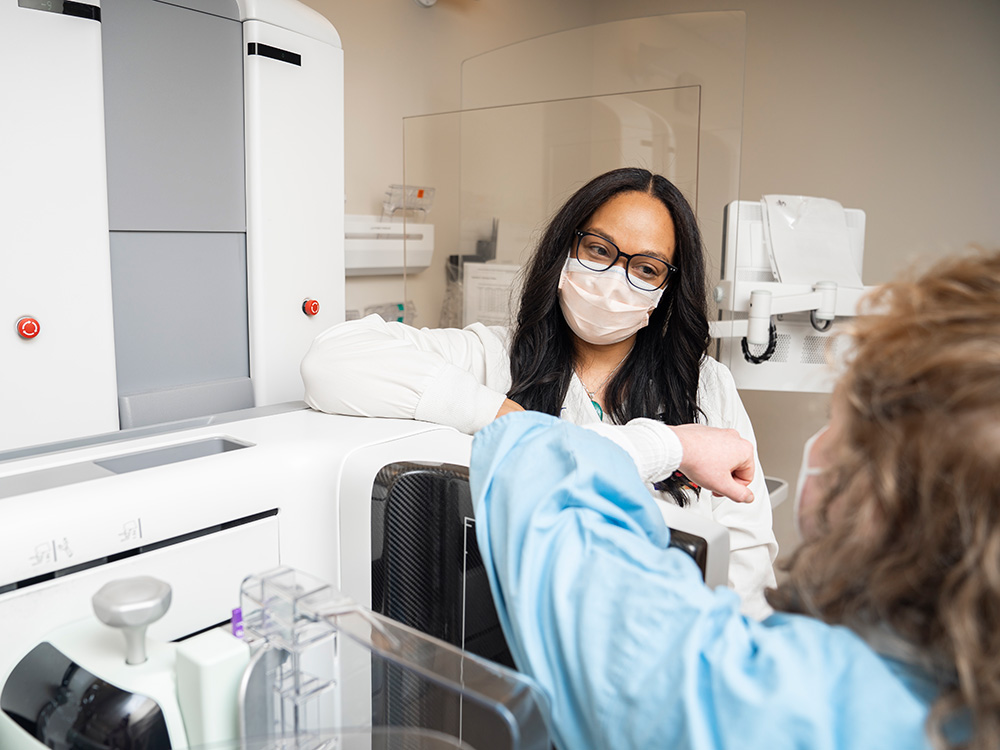
Emotional support person, coach, advocate, guide—these are all terms Amber S., RN, uses to describe her role at Huntsman Cancer Institute. The first and only breast imaging nurse coordinator at the cancer hospital, Amber helps patients navigate the entire breast biopsy process.
When a screening mammogram shows a breast abnormality like a mass or calcification, the doctor may order a biopsy—a procedure where tissue is removed from the area of concern and reviewed under a microscope to determine whether it is cancer. Amber supports patients throughout the process, from pre-biopsy needs to mid-procedure support to post-biopsy instructions and follow-up appointments.
Breast imaging teams consist of radiologists and mammography technologists and don’t always include nurses. Mammography techs run the imaging equipment and assist doctors during the procedures. Breast imaging radiologists are doctors who evaluate mammogram, breast ultrasound, and breast MRI images to look for abnormalities, and they perform biopsy procedures.
A patient needing a breast biopsy goes through several steps and works with several people. Phoebe Freer, MD, says patients had a lack of continuity in that process. Freer is a radiologist at Huntsman Cancer Institute and chief of breast imaging at the University of Utah. "One radiologist will recommend the biopsy, another may perform the biopsy, and someone else may call the patient with results," she says. "I knew we needed someone in our department with a nursing background who was qualified to discuss sensitive issues with patients while truly focusing on their needs and helping navigate the path for them."
"It’s really important [to patients] to have somebody distract them, hold their hand, remind them to breathe, stroke their shoulder—whatever they need."
Amber
Coming into the role, Amber was tasked with looking for gaps in the biopsy procedure process. She used elements of her past experience in quality assurance, psychiatric health care, and case management to create a unique role tailored to the needs of Huntsman Cancer Institute breast imaging patients.
In addition to becoming patients’ main point of contact, Amber saw they needed emotional support during what she calls "our two more challenging biopsies"—stereotactic biopsy and MRI-guided biopsy. These procedures use imaging to help the physician see where to place the biopsy needle that withdraws tissue from the mass or calcification. Both require patients to hold very still during uncomfortable and often stressful breast compression and tissue removal processes.
"It’s really important to have somebody distract them, hold their hand, remind them to breathe, stroke their shoulder—whatever they need," Amber says. Communication is crucial all along the way. After the procedure, patients can contact Amber with any concerns or questions. When the biopsy results come in, she delivers the news—good or bad. If the patient is diagnosed with breast cancer, Amber is there to guide them as they wait for the first appointment with their oncologist, which can be anywhere from one to three weeks. "That’s a long time to have this diagnosis and not have somebody to call and ask questions," she says. "Patients call me multiple times to review their pathology or to say, ‘Can you explain to my husband what you said to me?’’’
If patients are worried about whether they can afford treatment, Amber puts them in touch with financial services. If someone needs emotional support, "I’ll email the social worker in the breast cancer clinic and say, ‘This patient is really struggling. Can you keep her on your radar?’"
Amber plans to complete the Breast Patient Navigation Certification Program, a national certification established to help individuals overcome barriers to preventive services and navigate breast cancer treatment. As the program description explains, "Moving a patient through a breast care/cancer continuum is a complex and highly individualized process. The complexity is significantly reduced with the assistance of an individual who is trained to navigate a patient through the processes of care."
Certified breast patient navigators must meet certain standards and demonstrate advanced knowledge and competency in breast patient navigation. Upon completion, Amber will be the first certified breast patient navigator at Huntsman Cancer Institute.
Amber’s breast imaging coordinator role embodies Huntsman Cancer Institute’s commitment to providing the best care possible and meeting patients’ needs every step of the way—from advocating for them to connecting them to resources to simply holding their hands.